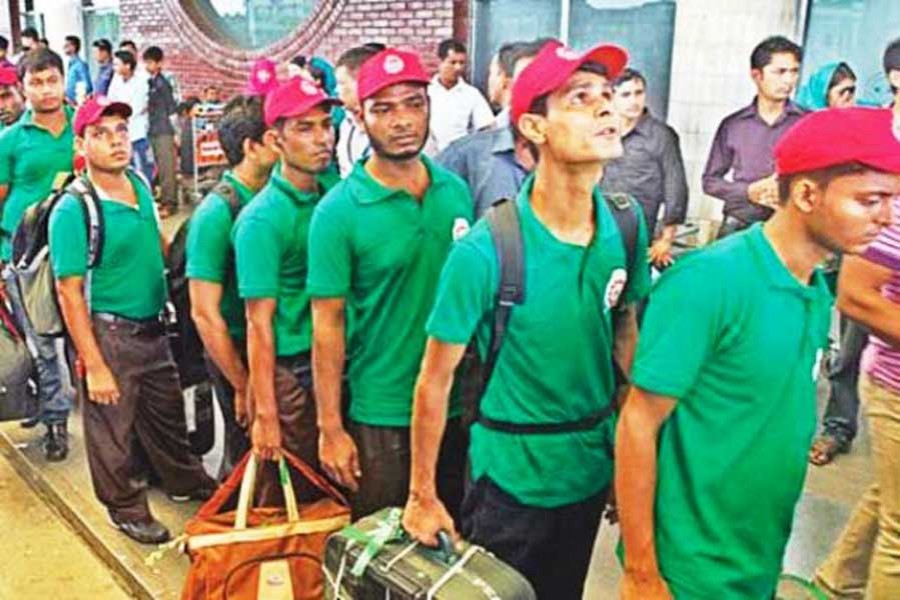With steep decline in manpower export to the Middle East, especially Saudi Arabia, the country's remittance earnings from the non-resident Bangladeshis (NRBs) abroad are likely to fall in the coming months.
Bangladesh's overseas employment, according to an official estimate, dropped by more than 24 per cent in the first nine months of the current year as compared to that of the previous year. The main destination point of the migrant workers has so far been the Middle East.
But the Gulf nations, mainly Saudi Arabia, are not hiring workers from Bangladesh on a large scale, creating negative impact on overall overseas job scenario in the sector.
A total of 555,393 Bangladeshis, according to a report, found job abroad from January to September of 2018. The number was 736,461 in the corresponding period of 2017. KSA is the largest job market for Bangladeshis, which hired a total of 412,397 workers in the first nine months of 2017. But the number came down to 187,223 workers in the matching period of 2018.
Slow development work and restrictions on certain jobs for foreign workers were the main causes behind major fall in manpower export to the Kingdom. Falling oil price, political uncertainty and slow development work are also making it difficult for foreign workers to get jobs.
The Saudi government has recently imposed a ban on 12 categories of jobs for foreign workers including car and motorbike showrooms, readymade clothes stores, home and office furniture stores, home appliances and kitchen utensils stores, electronics stores, watches and clocks store, optics stores etc. Bangladeshi workers, who went on individual visas, were mostly engaged in such categories of jobs.
In the last two years, Saudi Arabia has recruited the highest number of workers among the total overseas jobs from Bangladesh. Among 1.0 million workers, some 551,308 went to the Arab country in 2017. After the recruitment ban, Bangladeshi workers have lost their key job sectors as they are mostly engaged in such areas. The workers are also losing their running jobs as employers are not renewing their contracts due to the ban.
The situation is likely to continue for a long time as the Saudi government is reportedly reforming its policy in many areas. Now-a-days, Saudi employers are willing to recruit only female workers in its housekeeping sector. But the supply of women workers is not high from Bangladesh.
Other middle-eastern (ME) countries also hired lower number of workers this year than the previous year. In the first nine months of the current year, Qatar recruited 56,708 workers from Bangladesh, Oman 53,372, and Kuwait 25,652. But the three countries hired 64,396, 66,073, and 37,861 workers respectively in the first nine months of 2017.
On the other hand, Malaysia has also suspended manpower recruitment from Bangladesh through the existing system under 'G2G Plus' deal due to some alleged unethical practices of the recruiting agencies. The south-east Asian country is now working to launch a new system for hiring manpower. As such, until introduction of the process, labour migration to the country will remain held up.
The trend suggests that the goal of sending 1.2 million workers abroad in 2018, as fixed by the ministry, may not be achieved. However, the Bangladesh Association of International Recruiting Agencies (BAIRA) said the negative trend will not continue for long. At the end of the year, the number of employment will increase notably, it added.
Bangladesh should try to tap other markets like rich nations in Africa and other oil-rich Gulf countries like Qatar, Kuwait and the UAE to narrow the gap. In the past, workers could manage to get jobs, but now-a-days, it is difficult due to economic slowdown in most of the Middle Eastern countries. Although the migration cost has come down in recent times, it is still much higher.
However, it is to be noted here that most manpower-importing countries are interested more in employing skilled workers. The authorities should take pragmatic steps to create a sizeable manpower, properly trained in trades that are in high demand in those countries. Most of the Bangladeshis on jobs abroad are poor and uneducated. There are heavily underpaid and face deprivation by overseas employers very often.
In order to stop the falling trend of manpower export, it is necessary to launch vigorous diplomatic drive to persuade the traditional manpower importing countries to open their doors to the Bangladeshi workers. The Bangladesh missions need to be restructured with a view to effectively dealing with the emerging situation.


